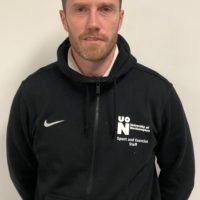Saul Cuttell was appointed as Lecturer in Sport and Exercise Science at the University of Northampton in December 2015 and then Programme Leader for Sport Science in 2018. Saul achieved his Bachelors (Hons) degree in Sport Studies from Bedfordshire University and completed his master’s degree in Sport and Exercise Physiology from Roehampton University. Saul’s research focuses on mainly environmental physiology, exercise induced muscle damage and the repeated bout effect. More recently Saul’s research has been centred on Whole Body Cryotherapy (WBC) and anthropometric factors that influence skin and core cooling. Saul is currently undertaking his PhD in the muscular adaption to different forms of eccentric muscle contractions and the onset of recovery from cooling or warming. Saul has developed a research profile and has published in a number of peer reviewed international journals. Saul welcomes any enquiries with regards to research collaborations.
Qualifications
- PhD (ongoing; The repeated bout effect and the use of different water immersion strategies for muscular recovery)
- PGCE (Professional Graduate Certificate in Education), University of Northampton (2013)
- MSc in Sport and Exercise Physiology, Roehampton University (2011)
- BSc (Hons) Sport Studies, Bedfordshire University (2009)
Professional Affiliations
- British Association of Sport and Exercise Sciences (SE Physiology)
- European College of Sport Science (ECSS)
- Physiological Society Affiliate Member
- UKSCA Member
